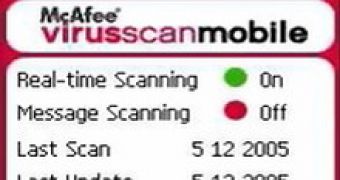McAfee has announced automated online virus scanning for the market-leading Symbian Signed mobile application certification program. The Symbian Signed program, which authenticates and tests third-party applications against industry-agreed quality guidelines, will now include virus scanning to provide additional confidence to network operators and consumers. Symbian develops Symbian OS, the market-leading open mobile operating system for advanced mobile phones, also known as smartphones, which is licensed to the world's leading handset manufacturers.
The growing Symbian developer community and increasing volume of shipped Symbian smartphones to over 70 million to date has driven the number of commercially available applications to over 5300. During the second half of 2006, all applications and content submitted for Symbian Signed certification will automatically be scanned using the McAfee anti-virus engine before being passed on to the certification stage. Virus scanning as part of the application certification submission process continues to demonstrate Symbian Signed thought leadership and its best practice approach to mobile application development.
"As a technology leader and one of the oldest PC security companies, McAfee is pleased to partner with Symbian to provide security screening for its certification program," said Victor Kouznetsov, Sr. Vice President, McAfee Mobile. "Unlike the PC environment where McAfee is finding new viruses every day, the threat to mobile phones is still extremely low. However, as the features and complexity of modern mobile operating systems advance and Symbian smartphones become increasingly more popular, so must the ways in which they are protected. Combining McAfee's virus scanning solution, Symbian Signed and the Symbian OS security architecture will ensure continued secure user experiences and prevent mobile viruses following in the footsteps of their PC counterparts."

 14 DAY TRIAL //
14 DAY TRIAL //